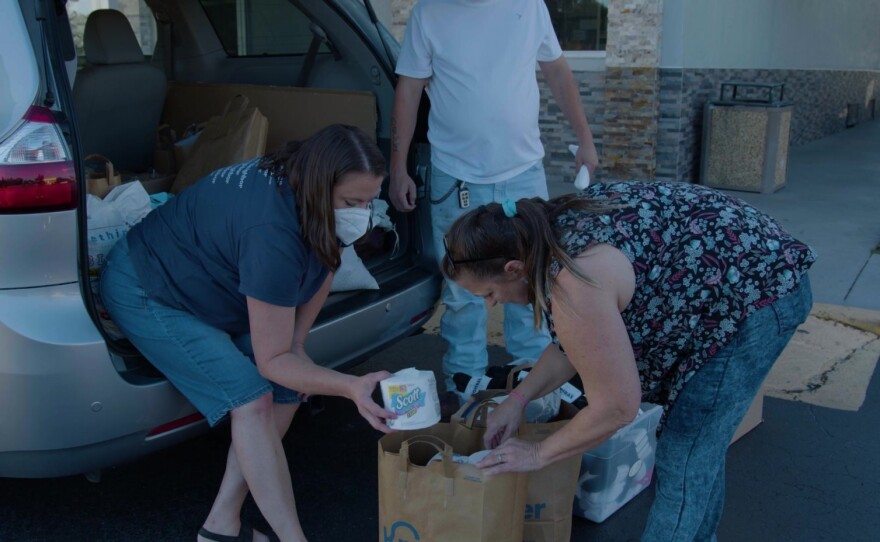Sandra Witherspoon heads toward South Richmond on an afternoon in early October with a trunkload of food and her phone buzzing with messages from families in need.
Witherspoon is the founder of RVA Humble Beginnings, a faith-based charitable organization that serves “the homeless and the hopeless,” she said. Each week, she provides anyone who seeks her out with food, clothing, shoes, diapers or hygiene products. She collects it all through donations, stockpiles it in her garage, then delivers it one brown bag at a time.
“If we weren’t providing these services, I don’t believe people’s needs would be met,” Witherspoon said.
Witherspoon is on her way to a part of Midlothian Turnpike near the Chesterfield County line. Dozens of families who cannot find or afford a home have turned to budget motels on the stretch of road as housing of last resort.
Rents have risen more than 20% in the Richmond area since the start of the COVID-19 pandemic, according to data made available by CoStar, a real estate analytics firm. After three successive years of rent increases, families earning less than the Richmond MSA’s median income of $101,000 are hard-pressed to find a place they can afford in a region reeling from an affordable housing shortage. People with other barriers to renting, like a past eviction or poor credit, are at an even greater disadvantage when searching for housing.
At the same time, the rising cost of living has compounded the strain on families Witherspoon serves. Inflation has driven up the cost of goods about 10% compared to the same time last year. Food prices have risen even more sharply, according to the Bureau of Labor Statistics.
For families living in motels, paying more for food and other goods means they have fewer dollars to devote to keeping their room for another night or saving for move-in expenses for an apartment, like a security deposit.
“We are getting the phone calls from people in the community that need help, and they're at their wit's end,” said Eric Leabough, director of Henrico County’s Department of Community Revitalization. “They are days within becoming homeless, and we're having to scramble and direct them to resources.”
Since 2018, Leabough said his department has received $10 million in federal funding for programs to help connect Henrico residents with housing, food and other basic needs.
“And I'll be candid, we can't always help,” he added.
Organizations like Witherspoon’s are left to fill the gaps. At the start of the year, she was regularly helping about five people on her weekly dropoff route. Since then, the number of people relying on her care packages has risen to roughly 30.
The uptick has coincided with the expiration of several pandemic-era programs, like supplemental food access benefits and emergency rental assistance — safeguards that were crucial for families living in poverty during the pandemic.
“[Families] are having to rely a lot more on nonprofits or the school system to get any kind of food to put on the table,” said Kristin Riddick, the community housing programs manager for Housing Families First, a nonprofit that works directly with families with school-aged children living in hotels in Richmond, Henrico and Chesterfield.
"With the food and the gas price increases, there has been less to go around for rent or [a] hotel stay,” Riddick said. “So, a lot of times, families are having to make difficult choices between paying for gas to get to their job, or putting food on the table, or saving up for a deposit, or paying their rent. It's put families in a really tough spot, financially."
Matt Sprouse and Mische Blakely have faced that this year.
The family’s previous rental was infested with bedbugs, and the landlord told Sprouse he could not stay there with children. Finding a new apartment on short notice proved difficult. Even with $3,000 for a deposit, the couple could not qualify for a new apartment because of credit issues.
With no other option, they moved with their three children — ages 12, 10 and 2 — to the Host Inn on Midlothian Turnpike in the spring. The short-term stay has since stretched to more than six months. Keeping the room costs them $65 per day or $400 per week — more on a monthly basis than the region’s average rent.
Paying the sum each week has drained their savings. By early October, Sprouse was doing online surveys overnight to supplement their income and Blakely was picking up shifts at a Goodwill to make extra cash while waiting for her first check from a new call center job.
Feeding five people on what was left over after the room was paid for was impossible, the couple said. And they wouldn’t have been able to do either for much longer had they not met Witherspoon this fall, Blakely said.
“If it wasn’t for [Witherspoon] and all the support she has provided us with food, there were times when we most likely wouldn’t have eaten, and there’s times when we haven’t eaten for a couple of days,” Blakely said. “She’s our savior. Without her, we probably wouldn’t be living here because we’d be spending astronomical amounts on food to feed the five of us.”
Like others on Witherspoon’s route, the family coordinates with her each week for meals they can cook in their room and anything they might need: meat, canned and dried goods, and snacks for their children. Witherspoon helped get them pots and pans so they could cook and save money by not eating out.
“By the middle of the month, they need help,” Witherspoon said. “They need food. They need assistance. I really believe if we weren’t out there helping, they wouldn’t get it.”
This story was produced with support from the journalism nonprofit Economic Hardship Reporting Project




